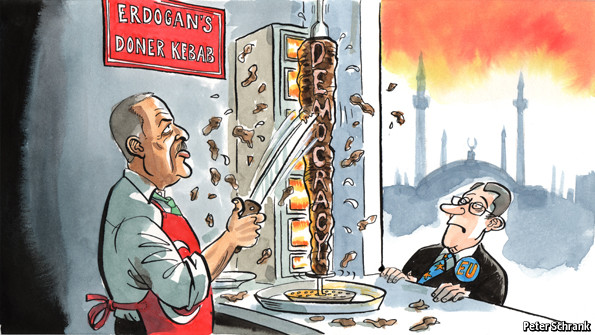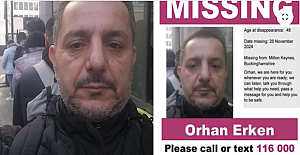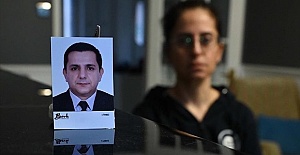The Economist has depicted Turkish Prime Minister Recep Tayyip Erdogan following the anti-graft operation that targeted the AK Party-led government, claiming that Erdogan is stripping away Turkey's democratic constitution and European Union process.
In the article titled "Going cold on Turkey", PM Erdogan was portrayed as a kebab man slicing away democracy which is represented in the form of a doner kebab (shawarma).
The magazine, known to be critical of the Turkish leader whenever possible, insisted that Erdogan risks wrecking Turkey’s chances of joining the European Union.
The magazine said, "Over the past year Turkey has seen a crackdown on protests, corruption scandals, a purge of the police and judiciary, paranoid talk of foreign plots and fifth columns, an economic slowdown and more attempts to Islamicise society."
”Until recently Mr Erdogan would boast that Europe needed Turkey, with its dynamic economy and geostrategic role, more than Turkey needed Europe. He pursued a policy of “zero problems” with his neighbours in the Middle East. When the Arab spring erupted in 2010 Turkey was held up as a model of moderate, democratic Islam. But the shine came off after his heavy-handed suppression of last June’s mass protests against plans to build over Gezi Park in Istanbul. His neo-Ottoman foreign policy fell apart when the Syrian civil war intensified and the Egyptian army unseated the country’s elected president, Muhammad Morsi, an Islamist ally. Turkey’s relations with America have been strained, not least because of a tentative decision to buy air-defence missiles from China and differences over Israel,” it continued.
The anti-graft operation that was launched on December 17 led to several high-profile arrests, including the sons of the former Turkish Economy and Interior Ministers, and the head of Halkbank, a state-owned bank.
The corruption investigation caused controversy in the Turkish political scene. Erdogan has defined the operation as a smear campaign aimed at undermining Turkish society. Erdogan has blamed the so-called ‘parallel state’, mostly backed by certain people in the police and judiciary who are widely believed to be followers of influential religious figure Fethullah Gulen’s Hizmet Movement.


 After Nesil Caliskan a by-election will be held in Jubilee ward in Enfield
After Nesil Caliskan a by-election will be held in Jubilee ward in Enfield Publishing the analysis, Labour’s Cllr Ergin Erbil said Everybody in Enfield deserves basic rights
Publishing the analysis, Labour’s Cllr Ergin Erbil said Everybody in Enfield deserves basic rights Gaza-Israel conflict Statement from Cllr Ergin Erbil, Leader of Enfield Council
Gaza-Israel conflict Statement from Cllr Ergin Erbil, Leader of Enfield Council Cllr Ergin Erbil was elected as the new Leader of Enfield Council
Cllr Ergin Erbil was elected as the new Leader of Enfield Council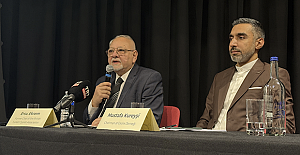 History of the Turkish Cypriot People symposium held in London
History of the Turkish Cypriot People symposium held in London Asia's most famous and powerful 100 women award given to WFPA President Naziya Bisenova
Asia's most famous and powerful 100 women award given to WFPA President Naziya Bisenova Death toll climbs to 5 as powerful Storm Bert batters Britain
Death toll climbs to 5 as powerful Storm Bert batters Britain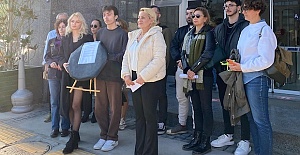 Turkish students are unable to obtain visas from the Italian Consulates
Turkish students are unable to obtain visas from the Italian Consulates Footballers are celebrating after Enfield Council officially opened a pitch
Footballers are celebrating after Enfield Council officially opened a pitch 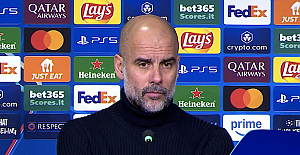 Pep Guardiola's Manchester City beaten by Juventus
Pep Guardiola's Manchester City beaten by Juventus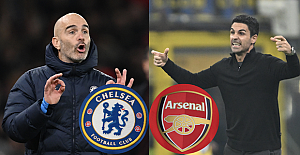 Chelsea to meet Arsenal in Sunday's London derby
Chelsea to meet Arsenal in Sunday's London derby Fenerbahce vs Manchester United Predicted line-ups! Jose Mourinho faces former side
Fenerbahce vs Manchester United Predicted line-ups! Jose Mourinho faces former side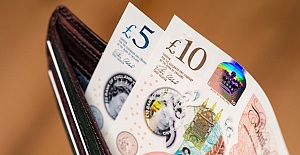 UK economy had zero growth between July and September
UK economy had zero growth between July and September Shape the future of housing services with The Enfield 500
Shape the future of housing services with The Enfield 500 DOUBLE-CAB PICKUPS TO BE CLASSED AS CARS UNDER NEW HMRC POLICY
DOUBLE-CAB PICKUPS TO BE CLASSED AS CARS UNDER NEW HMRC POLICY Guide to Selling Hoodies with Imprinted Book Quotes
Guide to Selling Hoodies with Imprinted Book Quotes





